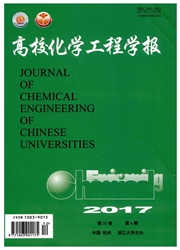

 中文摘要:
中文摘要:
采用由实验室从海底淤泥中筛选得到曲霉Aspergillussp.菌株,进行固体发酵生产胞外纤维二糖酶,粗酶液经过硫酸铵沉淀、超滤和两次离子交换层析纯化后,得到了电泳纯的纤维二糖酶,酶的比活力由10.98U·mg-1提高到131.2lU.mg-1。考察了该酶的酶学性质,结果表明该酶的最适温度为65℃,最适pH为4.5,具有较好热稳定性和pH稳定性。盐浓度对酶活力有较大影响,当NaCl浓度为40g.L“时具有最佳酶活,在20-150g·L-1的高NaCl浓度环境下的酶活均高于不含NaCI环境下的酶活,是典型的耐盐型酶。在高盐浓度下,该酶的热稳定性有较大的提高,半衰期比无盐条件下提高了2,3倍,说明纯化得到的纤维二精酶具有明显的海洋酶耐盐和耐热特性,有更广的应用范围。
 英文摘要:
英文摘要:
The Aspergills sp. isolated from the marine sediment was used to produce cellobiase via solid state fermentation. The cellobiase was obtained by ammonium sulfate precipitation, ultra-filtration and anion exchange chromatograph. The specific activity of the purified cellobiase increases to 131.21 U.mg-1 from that of the crude cellobiase (10.98 U.mg-1). It was found that the optimal temperature and pH for the activity of the cellobiase are 65℃ and 4.5, respectively, and in the solution with NaCI concentration in the range of 20-150 g.L-1, the activity of the cellobiase is higher than that in the NaCl- free solution; so it is a typical salt-tolerant enzyme. Moreover, the thermostability of the purified cellobiase is remarkably improved in high salinity solution, and its half-life time increases by 2-3 folds of that in salt-free solution. It was also found that both the activity and thermostability of the cellobiase produced from the marine Aspergills sp. are better than those from other terrestrial fungus. The purified cellobiase is thermo-stable and salt-tolerant and shows great potential in industry.
 同期刊论文项目
同期刊论文项目
 同项目期刊论文
同项目期刊论文
 Preparation and characterization of supermacroporous polyacrylamide cryogel beads for biotechnologic
Preparation and characterization of supermacroporous polyacrylamide cryogel beads for biotechnologic Evaluation of poly(ethylene glycol)/hydroxypropyl starch aqueous two-phase system for immunoglobulin
Evaluation of poly(ethylene glycol)/hydroxypropyl starch aqueous two-phase system for immunoglobulin Preparation of ibuprofen-loaded chitosan films for oral mucosal drug delivery using supercritical so
Preparation of ibuprofen-loaded chitosan films for oral mucosal drug delivery using supercritical so Preparation of chitosan microparticles with diverse molecular weights using supercritical fluid assi
Preparation of chitosan microparticles with diverse molecular weights using supercritical fluid assi Isolation of immunoglobulin G from bovine milk whey by poly(hydroxyethyl methacrylate)-based anion-e
Isolation of immunoglobulin G from bovine milk whey by poly(hydroxyethyl methacrylate)-based anion-e Enhancement of Laccase Activity by Marine-derived Deuteromycete Pestalotiopsis sp J63 with Agricultu
Enhancement of Laccase Activity by Marine-derived Deuteromycete Pestalotiopsis sp J63 with Agricultu New hydrophobic charge-induction resin with 2-mercaptoimidazole as the ligand and its separation cha
New hydrophobic charge-induction resin with 2-mercaptoimidazole as the ligand and its separation cha Immiscible liquid-liquid slug flow characteristics in the generation of aqueous drops within a recta
Immiscible liquid-liquid slug flow characteristics in the generation of aqueous drops within a recta Novel NaCS-CS-PPS microcapsules as a potential enzyme-triggered release carrier for highly-loading 5
Novel NaCS-CS-PPS microcapsules as a potential enzyme-triggered release carrier for highly-loading 5 Protein adsorption behavior and immunoglobulin separation with a mixed-mode resin based on p-aminohi
Protein adsorption behavior and immunoglobulin separation with a mixed-mode resin based on p-aminohi Effect and mechanism of sodium chloride on the formation of chitosan-cellulose sulfate-tripolyphosph
Effect and mechanism of sodium chloride on the formation of chitosan-cellulose sulfate-tripolyphosph Co-expression of disulfide oxidoreductases DsbA/DsbC markedly enhanced soluble and functional expres
Co-expression of disulfide oxidoreductases DsbA/DsbC markedly enhanced soluble and functional expres Evaluation of mixed-mode chromatographic resins for separating IgG from serum albumin containing fee
Evaluation of mixed-mode chromatographic resins for separating IgG from serum albumin containing fee Evaluation and characterization of axial distribution in expanded bed. I. Bead size, bead density an
Evaluation and characterization of axial distribution in expanded bed. I. Bead size, bead density an Effects of ligand density and pore size on the adsorption of bovine IgG with DEAE ion-exchange resin
Effects of ligand density and pore size on the adsorption of bovine IgG with DEAE ion-exchange resin Purification of Immunoglobulin of Egg Yolk with Hydrophobic Charge Induction Chromatography: Compari
Purification of Immunoglobulin of Egg Yolk with Hydrophobic Charge Induction Chromatography: Compari Evaluation of a PEG/hydroxypropyl starch aqueous two-phase system for the separation of monoclonal a
Evaluation of a PEG/hydroxypropyl starch aqueous two-phase system for the separation of monoclonal a Preparation and evaluation of dextran-grafted agarose resin for hydrophobic charge-induction chromat
Preparation and evaluation of dextran-grafted agarose resin for hydrophobic charge-induction chromat Rapid freezing cryo-polymerization and microchannel liquid-flow focusing for cryogel beads: Adsorben
Rapid freezing cryo-polymerization and microchannel liquid-flow focusing for cryogel beads: Adsorben Adsorption of rutin with a novel beta-cyclodextrin polymer adsorbent: Thermodynamic and kinetic stud
Adsorption of rutin with a novel beta-cyclodextrin polymer adsorbent: Thermodynamic and kinetic stud Enhancing the activity and thermostability of thermostable beta-glucosidase from a marine Aspergillu
Enhancing the activity and thermostability of thermostable beta-glucosidase from a marine Aspergillu Formulation of Poorly Water-Soluble Compound Loaded Solid Lipid Nanoparticles in a Microchannel Syst
Formulation of Poorly Water-Soluble Compound Loaded Solid Lipid Nanoparticles in a Microchannel Syst Cryo-copolymerization preparation of dextran-hyaluronate based supermacroporous cryogel scaffolds fo
Cryo-copolymerization preparation of dextran-hyaluronate based supermacroporous cryogel scaffolds fo Microbial Side-Chain Cleavage of Phytosterols by Mycobacteria in Vegetable Oil/Aqueous Two-Phase Sys
Microbial Side-Chain Cleavage of Phytosterols by Mycobacteria in Vegetable Oil/Aqueous Two-Phase Sys Influences of Ligand Structure and pH on the Adsorption with Hydrophobic Charge Induction Adsorbents
Influences of Ligand Structure and pH on the Adsorption with Hydrophobic Charge Induction Adsorbents Preparation of Cellulose Adsorbents with Ionic Liquid and Pore Expansion for Chromatographic Applica
Preparation of Cellulose Adsorbents with Ionic Liquid and Pore Expansion for Chromatographic Applica Molecular recognition of Fc-specific ligands binding onto the consensus binding site of IgG: insight
Molecular recognition of Fc-specific ligands binding onto the consensus binding site of IgG: insight An integrated expanded bed adsorption process for lactoferrin and immunoglobulin G purification from
An integrated expanded bed adsorption process for lactoferrin and immunoglobulin G purification from Microchannel liquid-flow focusing and cryo-polymerization preparation of supermacroporous cryogel be
Microchannel liquid-flow focusing and cryo-polymerization preparation of supermacroporous cryogel be One-Step Purification of Lactoferrin from Crude Sweet Whey Using Cation-Exchange Expanded Bed Adsorp
One-Step Purification of Lactoferrin from Crude Sweet Whey Using Cation-Exchange Expanded Bed Adsorp Poly(hydroxyethyl methacrylate)-based composite cryogel with embedded macroporous cellulose beads fo
Poly(hydroxyethyl methacrylate)-based composite cryogel with embedded macroporous cellulose beads fo Separation of Recombinant Geranylgeranyl Diphosphate Synthase of Deinococcus radiodurans from Expres
Separation of Recombinant Geranylgeranyl Diphosphate Synthase of Deinococcus radiodurans from Expres A Novel Method for the Preparation of Spherical Cellulose-Tungsten Carbide Composite Matrix with NMM
A Novel Method for the Preparation of Spherical Cellulose-Tungsten Carbide Composite Matrix with NMM 期刊信息
期刊信息
